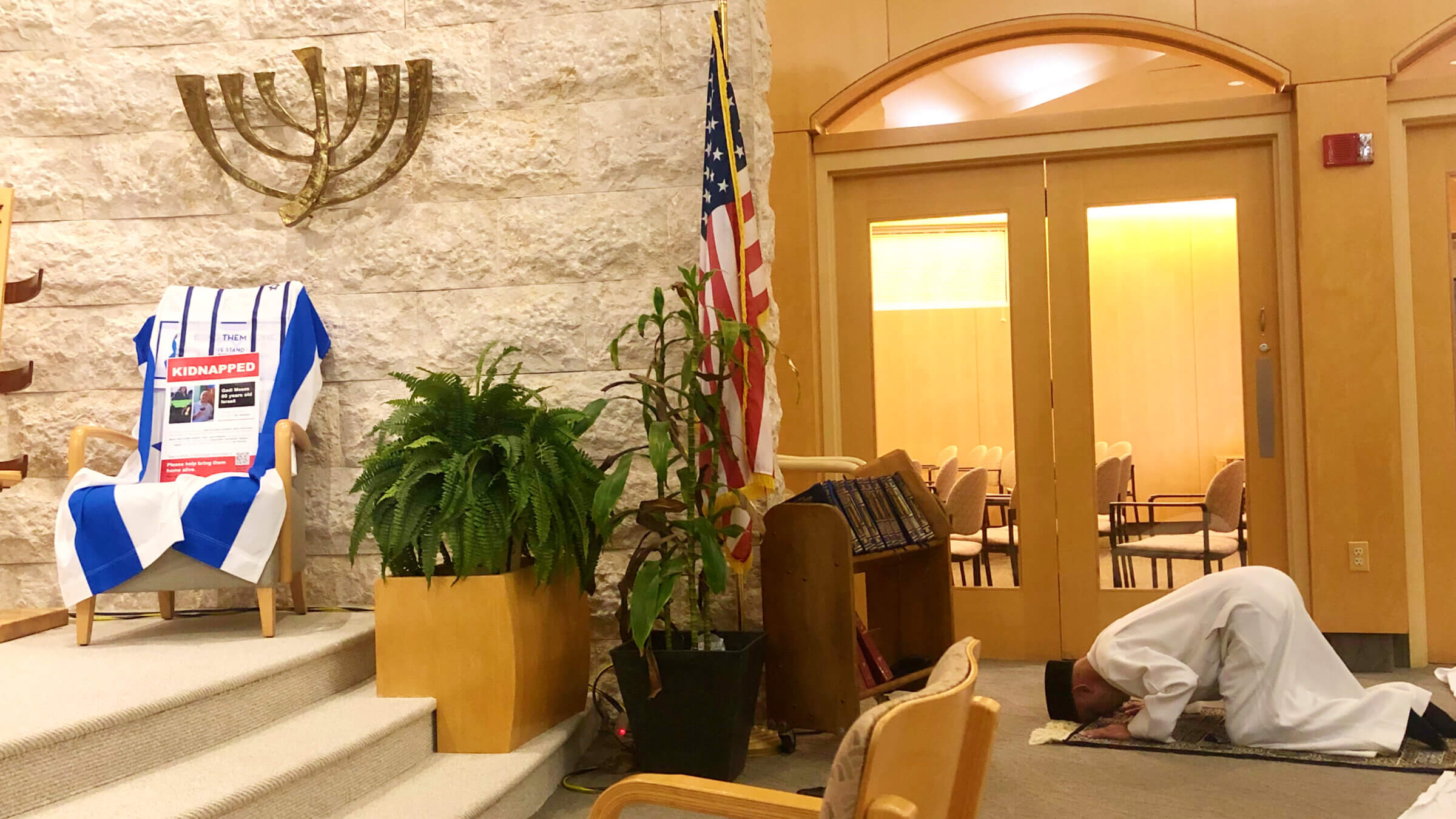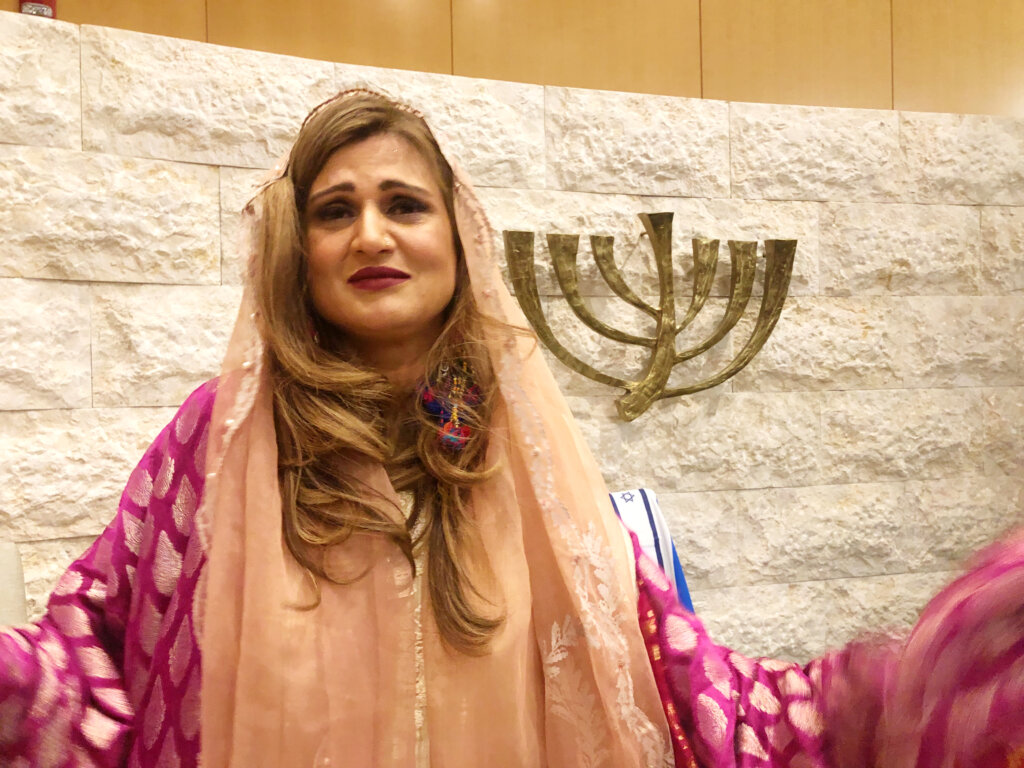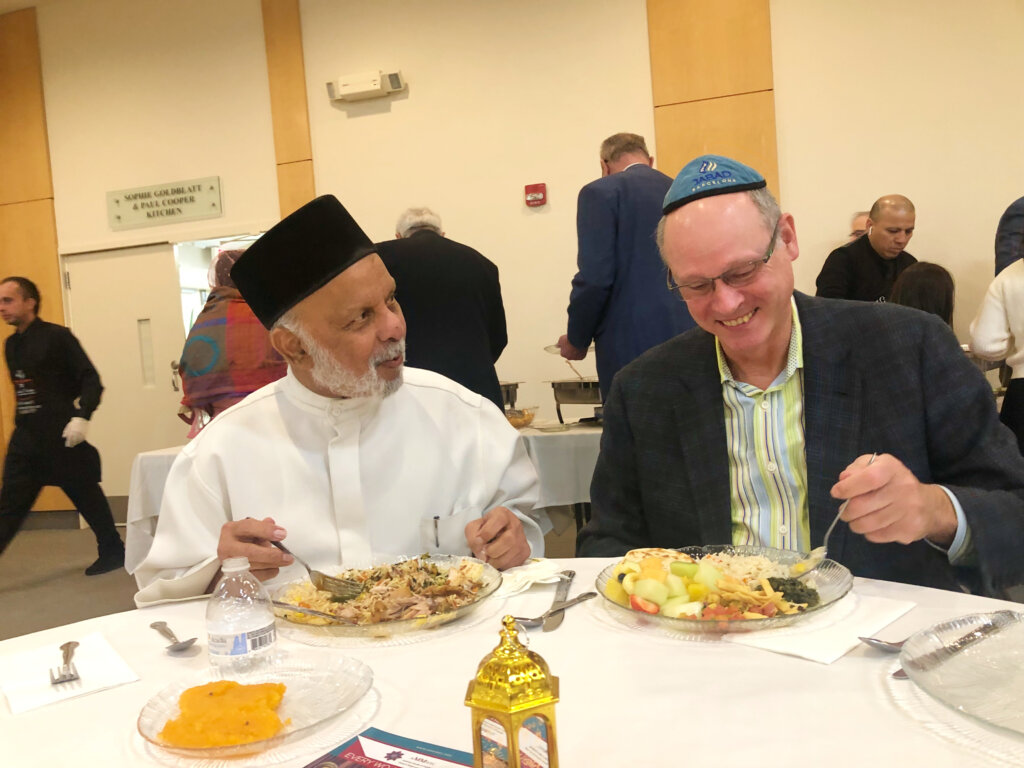Muslims at iftar dinner co-sponsored by Israeli embassy praised for their ‘courage’
A mosque on the invitation did not send representatives to the event, apparently because of the Israeli embassy’s involvement

Imam Faizul R. Khan prays at an interfaith service at Congregation B’nai Tzedek in Potomac, Maryland, on March 21, 2024 Photo by Lauren Markoe
Far fewer Muslims than in past years attended this year’s interfaith Ramadan gathering co-sponsored by the Israeli embassy, and a prominent Washington mosque listed on the invitation decided not to send any members.
Amid high tensions over the Israel-Hamas war, several threats had been made against the Thursday night Muslim-Jewish iftar, a meal to break the Ramadan fast, said Rabbi Stuart Weinblatt of Congregation B’nai Tzedek of Potomac, Maryland, the Conservative synagogue just north of Washington, D.C. which hosted the affair.
“Being here is an act of courage. It shouldn’t be, but it is,” Weinblatt told more than a dozen Muslims and about 150 Jews who showed up for the “Muslim-Jewish Solidarity Iftar” service in the synagogue’s sanctuary, and meal of kosher and halal Pakistani chicken, spinach and chickpeas.
“The forces of hate are all around us,” he continued, thanking the law enforcement officers stationed inside and outside the synagogue. “This iftar is an antidote.”
From the bima, both Jews and Muslims called for peace in the Middle East. They referred to “difficult” and “dark” days but few made direct mention of the war in Gaza, which has killed more than 30,000 Palestinians.

After the Muslim call to prayer rang through the synagogue’s speaker system, Imam Faizul R. Khan of the Islamic Society of Washington, shoeless, as is the Muslim custom, prostrated himself to pray with five other Muslims.
“This is how God wanted it to be,” Anila Ali, founder of the American Muslim & Multifaith Women’s Empowerment Council, said from the bima, and quoted the Quran in Arabic. “We are all children of Abraham.”
Steps away, a chair draped in an Israeli flag held a poster of Gadi Moses, one of hostages kidnapped by Hamas on Oct. 7. The militant group killed 1,200 in Southern Israel that day.
Fewer Muslims this year
While last year’s iftar was co-sponsored by the embassies of Israel, Bahrain and Azerbaijan, only one official from a Muslim majority country attended this year’s — Bosnia’s ambassador to the U.S. The ambassador, Sven Alkalaj, who wore a bright blue kippah, is Jewish.
Michael Herzog, Israel’s ambassador to the US., in a brief speech, called last year’s iftar, with Muslim countries’ co-sponsorship, “very memorable” and noted that “we don’t do it this year given the circumstances.”
Those circumstances, the war Israel is waging in Gaza, are apparently what kept away Masjid Mohammad, which calls itself “The Nation’s Mosque” and is credited on the invitation for helping to organize the iftar.

Kelly Goldberg, a Jewish board member of the council founded by Ali who introduced speakers at the event, said over dinner that the mosque’s leadership had said “they don’t support Israel so they’re not coming.” The mosque did not immediately respond to requests for comment. It is thanked on the invitation to the iftar for helping to make it possible, along with the House of Ruach and the Combat Antisemitism Movement and other groups.
Last year many more Muslims attended, Goldberg said, adding that she was disappointed in the mosque’s decision because “coming here per se doesn’t mean supporting Israel.”
Weinblatt, however, B’nai Tzedek’s founding rabbi, is also the founding chairman of the Zionist Rabbinic Coalition, a group formed nearly two years ago out of concern that American rabbis were drifting away from Israel. This week it released a letter opposing a ceasefire in Gaza “until all the hostages are released and Hamas is defeated.”
Goldberg said despite the fact that turnout among congregants was high, some Jews she knew had also disparaged the event. One had referred to it as “kumbaya b.s.” Another said it conflicted with the Jewish holiday of Purim, which begins Saturday evening.
But organizers said Purim was all the more reason to come, because it underlined commonalities between Muslims and Jews.
As Muslims fast daily during Ramadan, Jews observe the Fast of Esther before Purim. They broke their fasts together at B’nei Tzedek, with dates and water.
“I pray our fast may make us hungry for peace,” Weinblatt said.




















